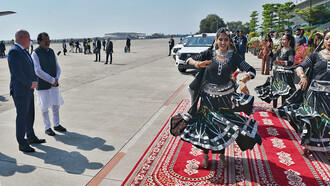In light of recent appeals for armed jihad against the Israeli occupation, Egypt’s Dar al-Ifta has offered its perspective. Dar al-Ifta affirmed that “jihad is a precise legal concept” with clear conditions, elements, and purposes. It also emphasized that no party or group lacking legal authority may issue fatwas on such sensitive matters, as these could threaten the security of societies and the stability of Islamic nations. The institution underscored that supporting the Palestinian people in their legitimate rights is both a moral and humanitarian responsibility. However, it stressed the importance of ensuring that such support aligns with Palestinian interests and does not serve agendas that might lead to further destruction, displacement, and disaster.
Dar al-Ifta explained that the declaration of jihad and the decision to wage war must be made under the authority of a legitimate state and political leadership. This condition is not met when such declarations are issued by entities or organizations without legal standing. It further warned that inciting individuals to defy their governments or rulers could be seen as an invitation to chaos, turmoil, and corruption—acts Islam strictly forbids.
For many years, certain religious leaders have endorsed violence against those who do not share their beliefs. These leaders have often failed to rigorously examine the attitudes, ideas, and motives behind their rulings. In some cases, political motives and the arms trade have promoted violent extremism, masked in religious or sectarian rhetoric.
Prior to the October 7 attacks—which took the world by surprise in a matter of hours—it was rare to judge ideologies. But the aftermath brought a wave of bloodshed, leaving thousands dead and sowing seeds of revenge and ongoing retaliation. In the absence of a strong voice calling for peace, gunfire, missiles, and roaring aircraft dominate the landscape. Sadly, world peace remains under threat due to ongoing confrontations in Yemen, Lebanon, Syria, Tel Aviv, and potentially soon, in other regions such as India and Pakistan. Amid this volatile global environment, a reasoned voice emerged from a modest Egyptian fatwa. Initially overlooked, it boldly challenged the religious legitimacy of killing innocent civilians, particularly regarding the October 7 events.
Fatwas—Islamic legal opinions—have long played a central role in shaping Egypt’s social and political discourse. Institutions like Al-Azhar University have historically aligned with state narratives. Since 2013, under President Abdel Fattah al-Sisi, Egypt has invested heavily in combating extremism, especially after designating the Muslim Brotherhood a terrorist organization. Since then, state-issued fatwas have been used to legitimize policies, counter extremist ideologies, and consolidate religious authority under state control.
Though the specifics of this recent fatwa are still subject to interpretation, it may ultimately be seen as a rejection of violent jihad and a redefinition of the concept as incompatible with Islamic principles. Its emphasis on state-sanctioned authority appears to challenge extremist groups like ISIS, advocating for spiritual struggle rather than armed conflict. This aligns with Egypt’s broader counterterrorism strategy and may encourage peaceful interpretations of jihad.
Although the fatwa appears domestic in scope, it arguably reinforces the state’s role as the guardian of “moderate Islam” while sidelining radical Islamist voices. It positions Egypt as a partner in global counterterrorism, potentially strengthening its ties with Western nations. It could also influence other Muslim-majority countries to adopt similar interpretations, countering jihadist narratives. As Egypt seeks to redefine jihad, the nation appears to promote peaceful conflict resolution—favoring negotiation, mediation, arbitration, and international legal mechanisms. This encourages global cooperation to maintain peace through treaties and diplomacy. However, concerns remain over the risks of renewed conflict.
Dar al-Ifta’s fatwa on armed jihad could carry significant religious and political implications in the region. It underscores the delicate interplay between religion and politics and calls for a deeper examination of motivations and methods. Striking the right balance between security, religious freedom, and political inclusion is essential. It also highlights the importance of addressing the grievances—social, economic, and political—that fuel radicalization.
This fatwa could encourage Arab and Islamic countries to reevaluate their support for the Palestinian cause, favoring diplomatic solutions over military escalation. Governments may use the fatwa as religious support for their security policies, though some Islamist factions may view this as curbing their freedom of expression.
Still, it may help stabilize neighboring countries, including Israel, and reduce tensions in Western societies facing similar ideological challenges. The Palestinian cause has often been reframed, yet its foundation in justice and human rights remains resilient. Despite efforts to shift the narrative through violence, the humanitarian dimension—shaped by occupation and ongoing rights abuses—remains central.
Human civilization must act swiftly to establish a peaceful, human-centered discourse. This means rejecting the use of religion to justify violence in the Arab-Israeli conflict and reinterpreting religious texts through historical and social lenses to foster dialogue and tolerance. It also involves confronting extremist rhetoric and reaffirming that jihad is not synonymous with offensive warfare. In Islam, it is primarily a defensive concept bound by ethical guidelines, including the protection of civilians and the rejection of indiscriminate destruction.
This initiative must include a thorough review of texts historically used to justify violence. Verses about combat, for example, must be understood in the context of legitimate self-defense during periods of aggression.
We must confront politicized fatwas that incite hatred by promoting open dialogue with trusted religious authorities who reject the manipulation of religion for political ends. Muslim and Jewish scholars should be encouraged to engage in joint initiatives rooted in shared human values—justice, compassion, and respect for life. Historical examples of interfaith coexistence, such as those during the Andalusian period or in Arab cities under Islamic rule, can provide guidance.
It is vital to clarify that the Arab-Israeli conflict is a political struggle over land and sovereignty—not a religious war between Islam and Judaism. Avoiding stereotypes and separating Jewish religious identity from Israeli state policy is essential for productive dialogue.
Achieving peace will require empowering moderate religious voices and supporting scholars committed to renewing discourse and rejecting violence. Religious education should promote tolerance, self-criticism, and mutual respect.This broader humanitarian approach can be amplified through arts, drama, and digital media, sharing stories of coexistence and countering hate speech through creativity and storytelling.
Looking ahead, efforts will face challenges from extremist movements that seek to deepen divisions, especially where religious and national identities are intertwined. Religious rhetoric may be perceived as biased under the pressure of public sentiment. Transforming religious discourse into a force for peace demands courage, a critical reevaluation of religious heritage, and a partnership between religious, political, and civil society leaders. Peace cannot be achieved through words alone—it requires concrete action, justice, and shared security.















